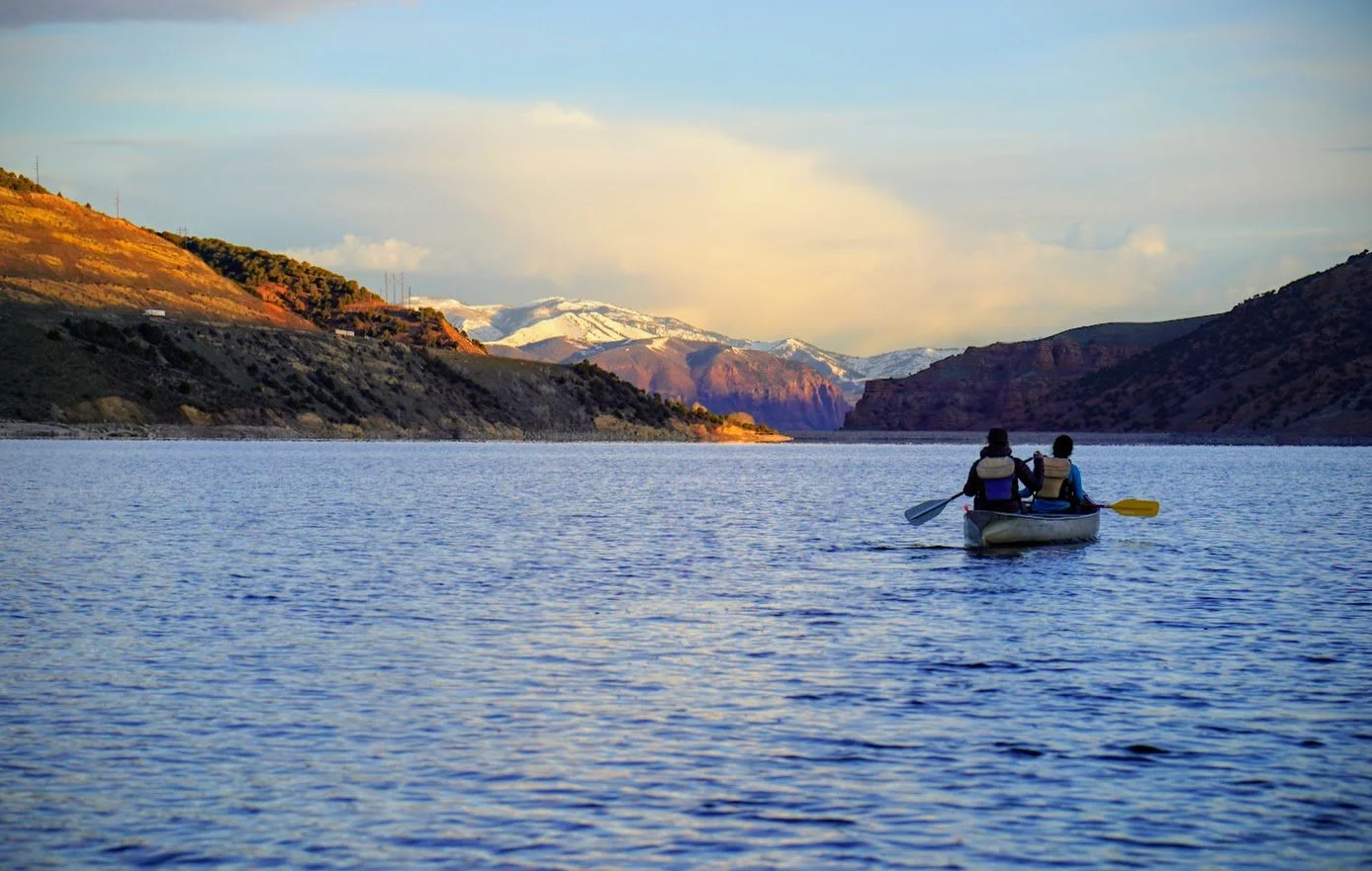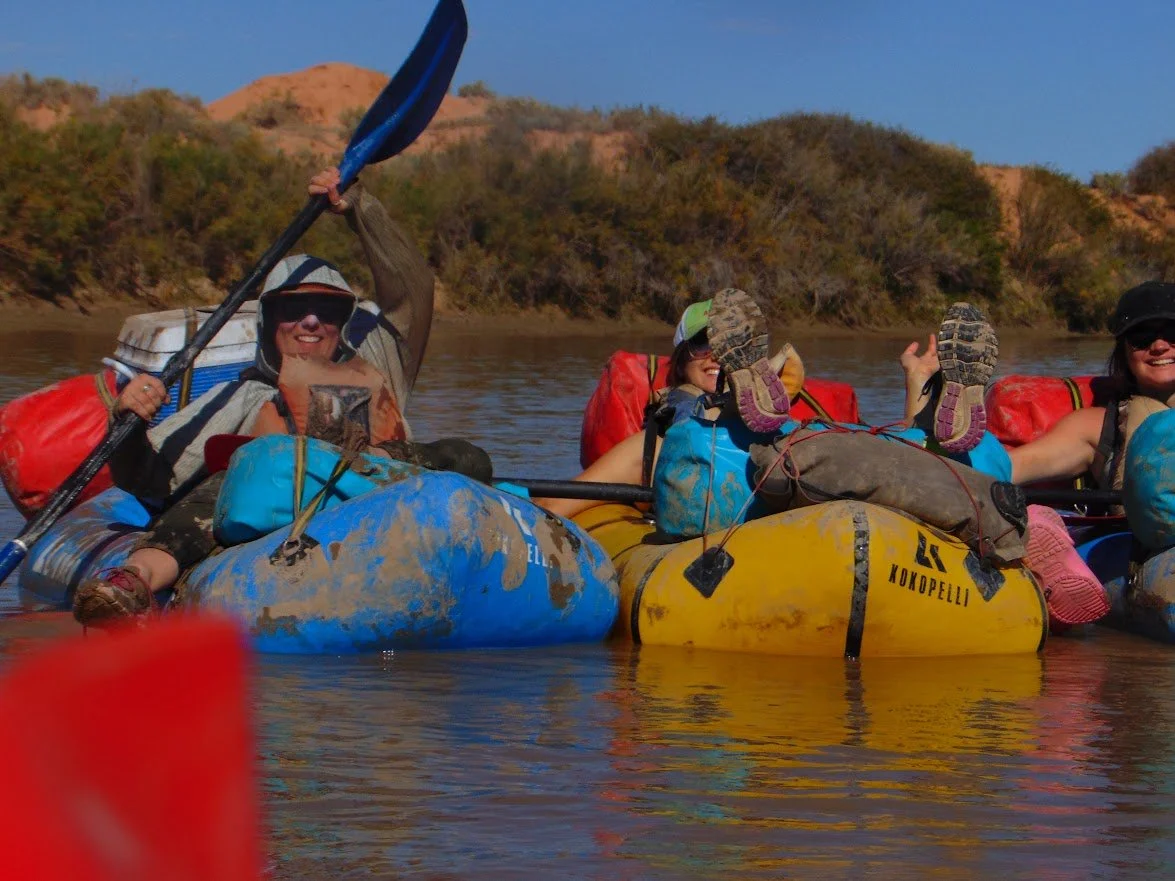'Mandarin, Canoes, and God's Personal Love'
We were canoeing a 60-mile stretch of Utah’s Green River. The first days in the desert were hard for all of them but especially for Hugo. All of them were high-achievers, familiar with pressure and hard work. But amidst the pressures of an Ivy-league university, you are still clean and indoors. You still have plumbing and electricity and someone else to cook your meals. The pressure of the desert is very different, with its dirt and its silence, and its demand that you cook your own food and set up your own shelter and carry your own waste.
The first day, two girls grounded their canoe on a sandbar and waited there, mid-river, unable to think of how to help themselves, until I got close enough to suggest a solution. The second day, Hugo’s oatmeal tasted like Dr. Bronner’s soap because he hadn’t rinsed out his bowl after washing it the night before. Also on the second day, I was helping to launch the canoes when I heard a commotion down the beach: Hugo was desperately trying to get his own canoe, which was pulled far up on the muddy beach, into the water while keeping his feet clean (an impossible task). Getting dirty can be frightening.
It was now the end of our second day on the river. The following day would be the Feast of the Annunciation. We were a hundred miles from any church, camped on the banks of the river in a bend of the canyon, cliffs rising on either side of us. The sun was setting, drenching our tents and our kitchen area in red-gold fire. The students were cooking dinner; one group had just dumped an absurd amount of salt in their pasta water and was trying, in vain, to salvage their mac and cheese.
Between teaching the basics of canoeing and camping, mending gear, and answering questions, this Annunciation-eve dinner was the first chance I had to find Hugo and exchange a few words with him in Chinese. I knew he was from China and spoke Chinese, since he had shared that with the group on the first night. But I hadn’t had a chance since then to tell Hugo that I, too, spoke Mandarin; I had studied it for about ten years, beginning when I was seven years old and finishing with three years of dual-credit study at a college near my home.
So, I left the cooking to my co-instructor and went over to Hugo’s cook group. “Hugo, I’ve been meaning to tell you that 我小时候学了一点中文 [when I was little, I studied a bit of Chinese]...” His eyes grew huge and his face absolutely lit up, brighter than the canyon sunset, even. “Whaaaaat??? My mother tongue!” he cried in English, and then started talking freely in Chinese. I understood and replied. Hugo began jumping up and down, punctuating rapid Chinese sentences with the English words, “My mother tongue! My mother tongue!” He was laughing, I was laughing, and everyone else was tuning in, startled. They couldn’t understand the words that we were saying, but they could understand that we were communicating in Hugo’s native language and that Hugo was immensely happy about it.
The next day, Hugo and I shared a canoe, and he told me, partly in Mandarin and partly in English, about his childhood and his college experience. Hugo was mostly raised by his grandmother, who had converted to Christianity as a young woman (in communist China that took a tremendous amount of courage). She would read aloud to him from the Gospels each night before he fell asleep. Despite his grandmother’s loving example, his faith was overwhelmed by the atheism in his school and culture; Hugo stopped practicing the faith as a middle-schooler. An intense experience during college brought him back to Christianity. At that point, his friendship with God became the most important thing in his life.
Hugo expressed that he loves his native language, but does not often speak it in America. “Why?” I asked. “Surely there are other foreign exchange students at your university!” Hugo explained that when he spoke his native language with other Chinese, he would usually start talking about God, and then the conversation would screech to a halt. They didn’t want to talk about God. Since he was unable to use his native language to communicate about the thing which was most important to him, he had stopped trying.
As we continued to paddle, Hugo asked me if I knew how to pray the Hail Mary in Mandarin. I didn’t. He taught it to me, phrase by phrase. Then, he began to explain each phrase, comparing its literal English translation to the words of the English Hail Mary. I recalled a moment in my freshman-year theology class when my professor was explaining the words of the Greek Hail Mary. The Greek word which is translated as “full of grace” is “kecharitōmenē,” meaning roughly “she who, having been filled with grace, is full of grace.” This is similar to the way that the Israelites’ temple is described after the Presence of God, which had remained with them for forty years in the desert, fills the Holy of Holies; the temple, “having been filled, is now full” of God’s Presence. Since the first moment of her existence, Mary has been filled to overflowing with God’s grace; at the Annunciation, she becomes the new Temple, the Ark of the new Covenant. All of this is contained in that simple English phrase, “full of grace”! I remember marveling at how the words which were so simple in my own language conceal the deeper meaning explicit in another language.
But now, on the river, we were not discussing the phrase, “full of grace”; instead, we were pausing at the very first word of the prayer, which in English is, “Hail.” The Mandarin, 万福 “WanFu,” does not mean precisely “Hail.”
“You know the Mandarin word, ‘Wan,’ right?” Hugo asked me.
“‘Wan’ as in ‘YiWan,’ the number ten-thousand?”
“Yes, ten-thousand. And ‘Fu,’ do you know what ‘Fu’ means?” I didn’t. “It means blessings or blessed. So, the first words of the prayer, ‘Wanfu Maliya,’ don’t just mean ‘Hail Mary.’ They mean, ‘Hail, O ten-thousand-times blessed Mary.”
With the bright desert sky above us, blue and protecting like the mantle of the Mother of God, Hugo and I took turns praying aloud the 万福玛利亚 (“Wanfu Maliya”), the Mandarin Hail Mary. When Hugo prayed it, the words flowed swiftly and sweetly like music. When I prayed it, the words came slowly and haltingly, my mouth struggling to make the foreign sounds which it had not practiced for so long. Nevertheless, we were both praying to the Mother of God on the great feast of the day when God came down and became her child. And we were praying to her in Hugo’s own mother tongue.
On the Annunciation, God was coming down, not just to ten-thousand-times-blessed Mary in Galilee, but also to Hugo and to me in the Utah desert. And He came, as He always comes, in a radically personal way. He comes in a way that we can receive Him. He became a human child of a human mother, to share and heal our nature, and to make it clear how personally He loves each one of us. He doesn’t love “humanity in general.” He loves you, and He loves me, and He loves Hugo.
Knowing Hugo’s love of his mother tongue and of “WanFu Maliya,” God bothered to ensure that the instructor who would be with Hugo in the Utah desert would have worked for ten years learning Mandarin so that she could talk with Hugo about “WanFu Maliya” in his own language. That is personal love.
God is no stranger to personal encounters. After the resurrection, Jesus finds Thomas and tells Thomas to touch His glorified wounds. Through that touch, Thomas receives new faith. After the resurrection, too, Jesus finds Peter and tenderly leads him to a three-fold affirmation of love which counters his earlier denial. And this spring, Jesus found Hugo, and explained to him, through the beauty of His first book and through His exquisite, humorous providence, that he, Hugo, is God’s beloved son. On the Annunciation, God wrote a love-letter in the desert. His words were the canyons, the sunset, the river, and a conversation about Him in their midst, thousands of miles from China, in Hugo’s mother tongue.
Jesus would have battled the weariness, hunger, and thirst of the wilderness, just for me or just for you. He was suffering with my students and I as we endured tired arms, muddy feet and too-salty pasta on the Green River. He loves each of us like that. And as He came to live with ten-thousand-times-blessed Mary, He comes to live with us in every Mass and in every moment. “The Word became flesh, and dwelt among us, and we saw His glory,” writes St. John (Jn 1:14). We continue to see His glory, for He is still dwelling among us, “even until the end of the age” (Mt 28:20).




